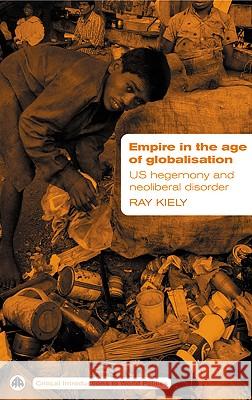Empire in the Age of Globalisation: Us Hegemony and Neo-Liberal Disorder » książka
Empire in the Age of Globalisation: Us Hegemony and Neo-Liberal Disorder
ISBN-13: 9780745324487 / Angielski / Miękka / 2005 / 224 str.
Empire in the Age of Globalisation: Us Hegemony and Neo-Liberal Disorder
ISBN-13: 9780745324487 / Angielski / Miękka / 2005 / 224 str.
(netto: 136,59 VAT: 5%)
Najniższa cena z 30 dni: 142,24
ok. 30 dni roboczych
Bez gwarancji dostawy przed świętami
Darmowa dostawa!
This book examines the relationship between US hegemony and contemporary globalisation. Many introductory textbooks on globalisation tend to be simplistic and conservative. This book moves things forward, providing a critical review of the globalisation debate. Kiely reveals the weaknesses of globalisation theory, and argues that we can only approach a proper understanding of the contemporary world order by linking globalisation to debates on capitalism, imperialism, neo-liberalism and universal human rights. He explores US hegemony in the light of these issues, showing how 'liberal internationalism' cannot be separated from capitalism, neo-liberalism and US empire-building.Perfect for students of globalisation and international studies, the book covers the following issues: theories of globalisation and the relationship between capitalism, neo-liberalism and globalisation; the question of state sovereignty, institutions of global governance, liberal internationalism, cosmopolitanism, realism, imperialism, 'September 11th', the Bush II administration and the war in Iraq; Bretton Woods, development, neo-Keynesian and neo-liberal capitalism, capital flows, debt, US hegemony and global finance, and global poverty and inequality; cultural imperialism, Americanisation, universal human rights, democracy and freedom, and cultural standardisation; and contemporary globalisation, US imperialism, and the question of progressive alternatives to 'actually existing globalisation'.











